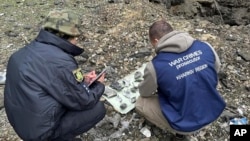Mountains of credible evidence indicate that from the beginning of Vladimir Putin’s invasion of Ukraine, Russian armed forces have been committing crimes against humanity and war crimes of every description, from torture and murder of civilians to abduction and sexual violence. By May of 2022, the Ukrainian government, as well as numerous NGOs and state actors, including the United States, was carefully documenting these crimes with an eye toward prosecuting the malefactors to the full extent of the law.
The United States has launched a number of programs to find and analyze evidence of atrocities committed by Russian forces in Ukraine. For example, the Conflict Observatory analyzes and preserves publicly available information and makes it available for use in ongoing and future accountability mechanisms.
The Atrocity Crimes Advisory Group, a joint project of the United States, the European Union and the United Kingdom, “provide[s] coordinated, multidisciplinary assistance to Ukrainian national authorities … [and] surges experts to the region to work side by side with their counterparts in Ukraine,” said Beth Van Schaack, U.S. Ambassador at Large for Global Criminal Justice.
“So individuals who worked at the former war crimes tribunal for Yugoslavia and for Rwanda are now working side by side with Ukrainians who are tackling 140,000 registered cases of international crimes.”
The United States also contributed 2 million dollars to the International Organization for Migration, said Ambassador Van Schaack. “This is very much focused on conceptualizing a broad range of transitional justice responses in Ukraine to Russia's war of aggression.”
“This funding will go towards conceptualizing various forms of repair for Ukrainian civilians and the Ukrainian population and helping to conceptualize ways in which this community can be rebuilt after Russia's war of aggression,” she said.
Ambassador Van Schaack’s own group has “deploy[ed] a lot of resources towards strategic litigation cases that might be brought outside of Ukraine in courts around the world,” she added.
“As soon as Russian perpetrators begin to travel, we're also utilizing our sanctions authorities against individuals and entities that are supporting and advancing Russia's war of aggression in Ukraine.”
“We're also looking for a number of ways to support civil society actors that are trying to deliver justice to Ukraine's victims,” said Ambassador Van Schaack.
The United States and its many partners stand with Ukraine in its commitment to mark those who abuse its people. There can be no impunity for these crimes. All those responsible must be held accountable.






